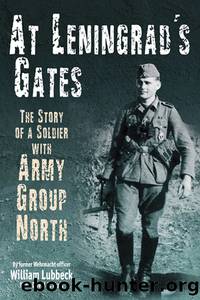At Leningrad's Gates by William Lubbeck

Author:William Lubbeck [Lubbeck, William]
Language: eng
Format: epub
ISBN: 9781935149378
Barnesnoble:
Publisher: Casemate Publishers
Published: 2010-08-31T00:00:00+00:00
THE ORANIENBAUM POCKET
July 1âAugust 11, 1942
On July 1 1942, the 58th Infantry Division was transferred roughly 75 miles northwest to the perimeter of the Oranienbaum Kessel, roughly 15 miles west of our old position at Uritsk. The Soviet troops in this area had been cut off from the main body of Red Army forces further east during the previous summerâs campaign and were now surrounded in a large semi-circular pocket with their backs to the Gulf of Finland.
Although the division occupied roughly 15 miles of the front at Oranienbaum, the general lack of action offered us a relative respite from combat. Just after our arrival, the company commander presented me with the Infanterie Sturmabzeichen commendation for close combat. As was the case with many other medals, this was received for an accumulation of combat service rather than for a specific action.
Although no major fighting took place at Oranienbaum, our heavy guns assisted in repulsing infiltration attempts by squads of Red Army soldiers about once a week. According to captured prisoners, the primary purpose of these raids was to seize one of our highly effective MG-42 machine guns that I had recently witnessed in action for the first time at the Volkhov.
Raiding parties also crossed No Manâs Land from our side, just as at Uritsk. Ranging in strength from 12-man squads up to rare 100-man units, these teams conducted reconnaissance of the enemyâs positions and attempted to capture prisoners for intelligence purposes. When these forays took place, I remained in constant readiness to call upon our companyâs guns to protect their retreat in case they encountered trouble. In most situations, this support was not necessary, but our howitzers helped rescue the situation two or three times.
Despite occasional fighting, the two-month deployment at Oranienbaum permitted our division badly needed time to recuperate and receive replacements. Our three and a half months of uninterrupted combat at the Volkhov had been unusual. In normal circumstances, troops engaged in intensive combat were permitted a rest after three or four weeks of heavy fighting.
On a relatively inactive front such as Oranienbaum, troops spent perhaps 80 or 90 percent of their time at the front. Despite rare rotations to the rear, we did sometimes have time to play a card game or write a letter in our bunkers. As in many other ways, our heavy weapons company was relatively better off than a regular infantry company in terms of the proportion of time that we spent on the frontlines versus time in the rear.
On August 1, the army promoted me to corporal (Unteroffizier). A week later, I was awarded the Winter Medal, which we referred to as the âfrozen meatâ medal, for surviving the bitter cold that had killed so many. More importantly, I was granted a long overdue threeweek leave from duty on August 11.
Departing Oranienbaum, I set out on the roughly 1,000-mile journey back to Germany. Having last seen my family and Anneliese in November 1940, it was hard for me to believe that I was finally returning.
Download
This site does not store any files on its server. We only index and link to content provided by other sites. Please contact the content providers to delete copyright contents if any and email us, we'll remove relevant links or contents immediately.
| France | Germany |
| Great Britain | Greece |
| Italy | Rome |
| Russia | Spain & Portugal |
Fanny Burney by Claire Harman(26603)
Empire of the Sikhs by Patwant Singh(23086)
Out of India by Michael Foss(16853)
Leonardo da Vinci by Walter Isaacson(13336)
Small Great Things by Jodi Picoult(7143)
The Six Wives Of Henry VIII (WOMEN IN HISTORY) by Fraser Antonia(5515)
The Wind in My Hair by Masih Alinejad(5095)
A Higher Loyalty: Truth, Lies, and Leadership by James Comey(4964)
The Crown by Robert Lacey(4817)
The Lonely City by Olivia Laing(4802)
Millionaire: The Philanderer, Gambler, and Duelist Who Invented Modern Finance by Janet Gleeson(4478)
The Iron Duke by The Iron Duke(4356)
Papillon (English) by Henri Charrière(4274)
Sticky Fingers by Joe Hagan(4199)
Joan of Arc by Mary Gordon(4112)
Alive: The Story of the Andes Survivors by Piers Paul Read(4033)
Stalin by Stephen Kotkin(3966)
Aleister Crowley: The Biography by Tobias Churton(3640)
Ants Among Elephants by Sujatha Gidla(3467)
